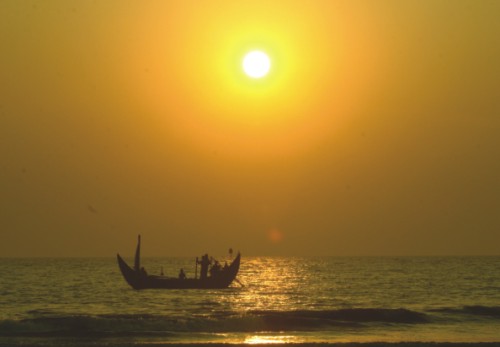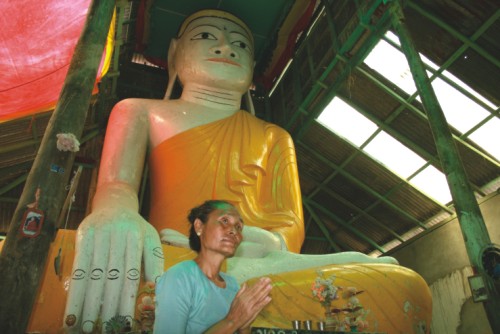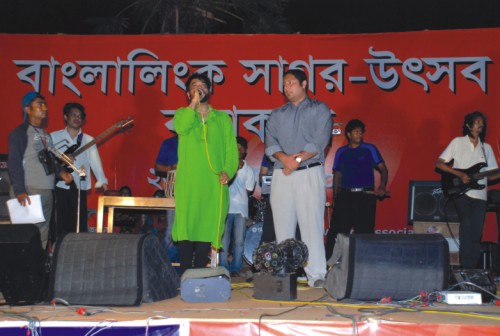|
Event
An Utshob in Charming Kuakata
Hana Shams Ahmed

Photo: Abu Salhey Ahmed Santu/ Voyager Holidays Limited
As green and beautiful as Bangladesh is, most people get stumped when asked about what the best place for a holiday would be. The springing up of several travel agencies offering tour packages inside the country is somewhat of a relief for people who prefer organised, hassle-free family trips. The longest natural beach of Cox's Bazar, the beautiful mountainous tea gardens in Sylhet, the mangrove forests of Sundarbans are some of the most popular tourist spots of the country.
But every year it's Cox's Bazar that hauls in the largest number of tourists from all over the country as well as from outside the country. With its comfortable travelling arrangements, luxury accommodations and variety of tourist attractions it's understandable to see why. Which is where the beautiful Kuakata loses out. Lined by tall, grandiose-looking palm trees Kuakata, 260 kilometres south of Dhaka and about 70 kilometres from Patuakhali district headquarters is one of the most beautiful sea beaches in the country. One of its main charms being the fact that both sunrise and sunset can be enjoyed sitting from the same place.

The Colourful Rakhain community observes various festivals throughout the year. Photo: Abu Salhey Ahmed Santu/ Voyager Holidays Limited
In the middle of November 2007, cyclone Sidr hit the south of Bangladesh. With wind speeds up to 240km/h (150mph) and a tidal surge of up to 20 feet high at some places everything in the path of Sidr from the Sundarbans, Barguna, Mongla port, Khulna, Bhola and Barisal was flattened to the ground. Kuakata and its neighbouring areas bore the brunt of Sidr's rage. All structures outside the embankment were wiped out. Hotels, restaurants, dry fish traders, roadside shops and other beachside businesses were severely affected. Sidr hit Kuakata at the peak of the tourist season, making matters even worse for the residents of the place. Even the Parjatan Hotel, which is usually booked for the entire season, was empty for weeks. Traders export dry fish to Hong Kong, Singapore and other countries in Asia, as well as locally and this industry was the worst affected in the entire region. Kuakata forest is situated on the beach and is a vital protection for scores of villages as well as being a natural flood protection embankment for the entire area and, according to the forest department officials, over 50 percent of the 3,000-acre forest in Kuakata was partially or totally destroyed.
Even more than four months after Sidr hit Bangladesh, the devastation caused by it is still visible along the trail towards Kuakata - debris, fallen trees, broken parts of tin houses still lie here and there. There are still scenes of houses being rebuilt. The hardship of the people in the south is only too visible.
The three months of the official tourist season came and went with almost no tourists visiting this spot at all. The lives and livelihoods of the locals came to an all-time low. But last weekend there was a sudden burst of activity at the beach. A huge stage was erected. There were posters everywhere inviting everyone from everywhere for a beach festival. Organised by the Kuakata Hotel, Motel & Resort Owners Association (KHMROA) and sponsored by Banglalink, the main aim of the Shagor Utshob 2008 was to bring life back to the beautiful Kuakata beach after the long post-Sidr lull.
Of the three days of this first ever festival in the area, the inauguration day on March 26 was marked by cultural programmes by the local Rakhine community and a discussion seminar celebrating Independence Day. Shagor mela, Bar-B-Q, Rakhain cultural presentations and a seminar titled 'Resurrecting Kuakata' were the highlights of the second day. The seminar discussed the potentiality of Kuakata as one of the premium tourist destinations and responsibility of different government and private bodies. The second and third evenings were completely musical nights. Along with local bands, Andrew Kishore and his entourage enchanted a packed beach full of locals and visitors from Satkhira, Barisal, Khulna, Rajshahi and Dhaka.
Banglalink's efforts to promote Bangladesh to locals and the rest of the world have been an inspiration. From a five-year beautification and development programme of Zia International Airport (ZIA) to sponsoring 300 people for an International Coastal Cleanup (ICC) in September 2007, where volunteers from around the world took to beaches and waterways to collect trash and polluting elements and the 'Nouka Baicha' or boat race held in Khulna in October 2007 where close to 100,000 people showed up to watch what turned out to be the largest attended boat race in recent history.

Shagor Utshob 2008 drew in huge crowds of people, which was a welcome change after three months of lull after the havoc caused by Sidr. Photo: Firoz Alom Khan/ MASTHEAD PR
"Tourism in South Asia has seen an increased demand in recent years," says Shamnoon Muheb Chowdhury, the PR and Communications Executive of Banglalink, "but the increase in Bangladesh has not matched with that. Our aim is towards creating awareness on responsible tourism. Cox's Bazar is already an established spot and we wanted to create a buzz to highlight these areas."
But to be established as a popular tourist spot, some problems need to be sorted out very soon. One of them is the journey to the place itself. There are no luxury buses going to Kuakata. Although only 260 kilometres from Dhaka the journey is extremely long and uncomfortable with six ferry rides along the way, it ends up to being more than a 10-hour journey from Dhaka. There are also not enough restaurants there to fulfil the tourists' needs, which Chowdhury feels is potentially a great business opportunity. "People here are also quite poor and tourism would make a great difference to their lives," he adds.
One of the most fascinating attractions in Kuakata is the local Rakhain community. In the eighteenth century, many Rakhain people migrated from their homeland in Arakan because of political turmoil and settled in different areas of Chittagong Hill Tracts and Patuakhali. The census of 1991 recorded the number of Rakhain population in Bangladesh at about 7,000. The Rakhains are a very colourful community and their cultural festivals are tourist attractions by themselves. They observe the spring festival and the Baishakhi, Maghi purnima and Prabarana purnima. 'Sundrey' is their greatest community festival and is observed for three days on the occasion of Chaitra Sankranti.

The devastation caused by Sidr. Photo: Abu Salhey Ahmed Santu/ Voyager Holidays Limited
“We were looking for a long holiday to hold the Shagor Utshob,” says the Vice President of KHMROA, Syed Badrul Ali Babu, who's been in the travel and tourism business for 26 years, “and the Independence Day provided us with the best opportunity.”
He says that for three months after Sidr there were virtually no tourists in Kuakata, and it was only on the 21st February holiday that there was some activity. “After the last three months the people of Kuakata had become very demoralised,” says Babu, “and there have never been shows like this. Our tourism season is only for three months. If the administration paid a little more attention to us we could raise this time-period to five months. That would really change the livelihoods of the people here.”

Dry fish export is a very lucrative business in Kuakata. Sidr destroyed the business of many traders Photo: Abu Salhey Ahmed Santu/ Voyager Holidays Limited
Sidr took away the lives of thousands of people. But the biggest fight after the devastation is for the people who survived. For the hundreds of thousands of families whose loved ones were taken away from them, whose personal and business property were destroyed beyond recovery and whose spirits were broken, life is far from back to normal. For three days from March 26 the Shagor Utshob brought in hundreds of tourists, but for 'Shagor Konna' Kuakata to live up to its name, it is the government authorities who have to pay more attention to this beautiful but neglected place. Copyright
(R) thedailystar.net 2007 |
